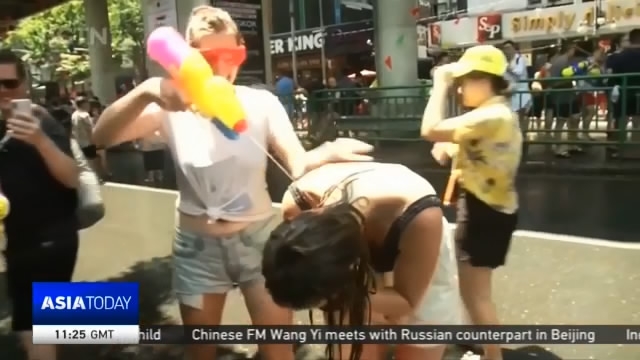
20:15, 23-Apr-2018
Thailand Road Deaths: Road accidents rise during New Year festival
03:47

The number of people killed on the roads in Thailand during its New Year festival increased this year. The seven-day Songkran holiday has been notorious for deadly traffic accidents over the years, as many drivers choose to travel under the influence of alcohol. But holiday road safety campaigns are hiding a wider problem that the country's roads are now so deadly, the number of annual fatalities is the equivalent to fighting a major war. Tony Cheng reports.
The fun and festivities of Songkran, the Thai water festival. Crowds of party goers take to the streets, splashing each other to stay cool in the tropical heat. But there is a hidden danger and its not from the end of a loaded water pistol.
Drunken revellers and dangerous drivers have caused road accident rates to rise so high, the holiday's now known as the seven deadliest days.
The holiday is a distant memory for Montha Sakdee. Her brother Pathavee was one of the most recent casualties. He'd been out celebrating with friends, racing on his recently purchased motorbike before he crashed and died.
MONTHA SAKDEE "I told him to be careful. I reminded him of the 7 deadly days campaign, and he said yes, but once he saw his friend, and they're both teenagers, they didn't pay attention."
His mother is now left to mourn her only son, just another statistic in the 417 deaths recorded this week. And despite government warnings, a seven percent increase on the death toll from last year. Thailands roads are ranked by the WHO as the most dangerous in the world. Ineffective traffic enforcement, poorly qualified drivers and overcrowded roads. Add alcohol into the mix and you have a recipe for disaster.
TONY CHENG BANGKOK "The statistics are astonishing. Last year it was estimated that 10,000 civilians died in the Syrian conflict. In the same time, twice as many people died on Thailand's roads, and this year its estimated there will be 30,000 fatalities."
The government's response is frequently criticised as too little too late. Highlighting the seven deadly days, ignores the other three hundred and fifty-eight. And in a country where 40 percent of road accidents are caused by alcohol, anti Drink Driving campaigns have done nothing to raise public awareness.
DR. TAIRJING SIRIPANICH SECRETARY, DON'T DRIVE DRUNK FOUNDATION "If they really want to reduce the death toll, they have to declare the war between Thailand and road crashes."
This year harsher punishments were promised. Bally was arrested driving with 5 times the legal limit of alcohol. She asked that her identity be concealed. For the next 15 days, she is confined to her apartment building by an alarmed ankle bracelet and banned from driving for 6 months. But although she knows she's done wrong, she can't promise it won't happen again.
BALLY, CONVICTED DRUNK DRIVER "I feel like I can drive, some kind of idiot thinking."
Tony Cheng CGTN "Because you were drunk?"
BALLY, CONVICTED DRUNK DRIVER "Right."
Tony Cheng CGTN "Do you think it will change the way you behave?"
BALLY, CONVICTED DRUNK DRIVER I don't think so. Nothing changes."
And that fatalistic attitude may be the hardest hurdle to overcome. Drivers who feel their fate is not under their control, but in the hands of the gods. Tony Cheng CGTN Bangkok.

SITEMAP
Copyright © 2018 CGTN. Beijing ICP prepared NO.16065310-3
Copyright © 2018 CGTN. Beijing ICP prepared NO.16065310-3